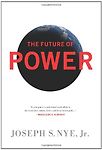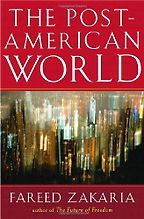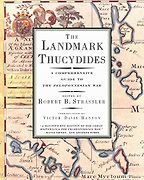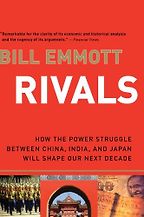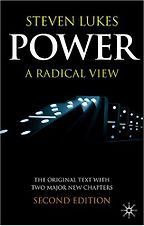What ties your book choices together, theme-wise?
In my book, The Future of Power, I argue that there are two great power shifts going on in the 21st century. One of these is power transition, largely from west to east. We sometimes call that the rise of China, though there’s more to it than that. The other great power shift is from all states, east or west, to non-state and non-governmental actors. We call that the diffusion of power. So the five books are about power transition and power diffusion.
Issues of transition are illustrated by Thucydides, going all the way back to that first chronicler of the rise and fall of powers and the Peloponnesian War. They also go forward to Fareed Zakaria’s account of the rise of the rest and Bill Emmott’s book about how in Asia you have major rivals in China, Japan and India. Then the other two books relate more to the diffusion of power. Steven Lukes’s book is a classic example of the three faces of power – how we sometimes think that power is simply the ability to coerce others, but we can also get the outcomes we want by structuring the agenda and creating preferences that people want. Richard Clarke’s book on the cyber world is a good example of that, but even in the cyber world you have threats as well as opportunities. So, that’s what holds the five books together.
We’re starting with Fareed Zakaria.
Zakaria is one of the best American commentators on world politics and foreign policy. He has the unique perspective of having been born in India and then doing his graduate degree in the US. He’s a keen observer of the US but with a great knowledge of the rest of the world. Zakaria looks at the issue of whether the US is in decline, and decides that the problem with the term “decline” is that if it means absolute decline, like ancient Rome, then it’s not a very good description of what’s happening in the US. The US is not like Rome, which was an agrarian economy. What the US is facing is not absolute decline but relative decline, in that the gap between the US and other countries is diminishing with the rise of China, India, Brazil and others. Zakaria chose a happy term which is better than relative decline – “the rise of the rest”.
I think that is a good description of what’s going on. You’re seeing, particularly in Asia, a return to normal. Normal was the period before the industrial revolution when Asia represented half the world’s population and half the world’s product. That declined dramatically because of the industrial revolution in North America, Britain and Europe. So by 1900, Asia produced only 20% of the world’s product. What we’re seeing now, in this century, is the return of Asia to normal proportions where it will represent half the world’s product and half the world’s population. This started with Japan and went on through South Korea, Singapore and Malaysia; it is now focused very much on China, but has an increasing emphasis on India as it approaches a 9% growth rate. I think Zakaria is quite accurate in his description of what is going on.
But Zakaria sees it basically as a positive thing? There is no reason why everybody can’t flourish?
That’s right. You can have positive relations from economic progress and growth. But that’s where Thucydides comes in: he points out that sometimes people are worried not just about absolute gains but about relative gains. That is, we’re all getting better off but if you’re getting a lot better off than I am, then you’re going to be able to exercise power over me and I begin to develop anxieties.
So when Thucydides is trying to account for the Peloponnesian War, an extraordinary war in the fifth century BC in which the Greek city-state system tore itself apart, he says the basic cause of the war was the rise in power of Athens and the fear that created in Sparta. He points out that when there is this kind of fear, and there is a belief that war is inevitable, it can itself become a cause of war. Some of the greatest wisdom on international politics and the rise and fall of power goes back to Thucydides in the fifth century BC.
That brings us to Bill Emmott’s book.
Yes, Rivals. Emmott notes that as we look at the rise of China, and the question of whether China will present the kind of challenge to the US that Athens did to Sparta or Germany did to Britain in the 20th century, we have to ask whether fear of the rise of China in the US will create that kind of reaction in the 21st century.
And what does he conclude?
He says that if you look more carefully, you see that Asia has its own internal balance of power. Asia is not just one country. As China’s power grows, the Japanese, Indians, not to mention the Vietnamese, South Koreans and so on become worried and ask themselves – how can we balance that power? That makes them actually welcome America’s presence, so you find that the situation in East Asia is an internal balance of power which may play to America’s favour. For example, these countries want an American alliance or close relationship.
If one took an analogy, Mexico might be looking for a Chinese alliance to balance American power in North America. That means the US does not have to be so fearful. Are we about to fall into Thucydides’s trap of creating a great conflagration out of unnecessary fear of a rising power? No. For one thing, the historical analogy of Britain, Germany and World War II doesn’t fit East Asia because Germany had passed Britain by 1900 whereas China is not going to pass the US in terms of overall power for decades.
But who in the US is actually afraid of China? Presumably ordinary Americans aren’t wandering around afraid of being outdone by China?
Well, there is a growing concern about China in the US. In the last election campaign in 2010, several hundred million dollars were spent on advertisements which dramatised the rise of China. There is one that portrays a set of Chinese leaders and generals sitting around 10 years from now saying: “Look how foolish the Americans were to let us get ahead like this.”
That must be Republican!
They’re sometimes Republican but they can also include Democrats who are worried about the loss of jobs, and the trade unions who feel jobs are being stolen.
Shall we talk about Stephen Lukes next?
He wrote his book on radical views of power in the 1970s, following a tradition of people writing that power was the ability to get others to do what they otherwise wouldn’t do. It gave the image of twisting arms, using coercion to get people to do things. This was a famous definition of power, developed by the Yale political scientist Robert Dahl in the 1960s. Dahl basically set a trend of how people thought about power.
Lukes said wait a minute, if I can set the agenda so that your items don’t even arise for us to discuss, then I don’t have to twist your arm. What’s more, he went on to say, if I can establish your preferences then I don’t have to coerce you to get you to do what I want. What Lukes did was to say there are three faces of power: coercion and payments (or sticks and carrots); setting the agenda so that your issues don’t come up; and thirdly, if you want what I want then I don’t have to spend anything on carrots and sticks because I have been able to affect your preferences.
That’s brainwashing!
That’s one of the great dangers, and Lukes does talk about it. Is there a situation in which this becomes a form of brainwashing, and how do we know? For example, if you have a Muslim woman in a full-face veil, it may be because she’s been trained by her culture to believe she should wear a full-face veil. Is that her free will or not? If you take an opinion poll and ask “are you wearing this because you want to?”, she’ll say “yes”. So her preference is to wear it. But then you ask her where the preference came from. That’s why Lukes’s work is so interesting, because he digs below the surface of these issues.
In my book The Future of Power I talk about hard and soft power. Hard power is the ability to use carrots and sticks, coercion and payments; soft power is using attraction and persuasion to do things. I often quote Eisenhower, who certainly knew about giving commands. He said: “To give a command is relatively easy. To get people to do what you want because they want to do it for you is much more difficult.”
I think that’s what we have to realise about leadership in general in an information age – it’s less hierarchical and commanding, and more like the centre of a circle where you have to use attraction and persuasion, creating networks to bring people together. That’s true not only at the level of domestic politics but also in international politics. Given the diffusion of power in global politics, leadership is going to involve soft power as well as hard power, getting people to develop networks and institutions to deal with problems. The combination of hard and soft power is what I call “smart power”.
This is all the kind of stuff that General Petraeus has been trying to do with counterinsurgency in Iraq and Afghanistan, isn’t it? Hearts and minds?
Yes. You use hard power to defeat the enemy but soft power to win the hearts of the civilian population. That means that killing a lot of civilians is a disastrous strategy. Not only ethically bad but counterproductive in terms of the goals of counterinsurgency. I have a chapter in my book on military power which goes into this in some detail.
You can think of hard and soft power on the macro level of international politics, but also on the level of family or workplace relationships. All human relationships on a huge and a tiny level involve these play-offs, don’t they?
Absolutely. In fact, in 2008 I published a book [The Powers to Lead] in which I said that hard, soft and smart power were not just categories of international relations but of human relations.
Tell me about Cyber War.
This is intriguing, because when you look at the enormous opportunities that the Internet has presented – economic efficiency, great communication – we generally think of the positive side. But what Clarke and Knake point out is that as we open these opportunities we also make ourselves vulnerable to their disruption. For example, you have the capacity to do damage in the physical world just by sending electrons across a border. You can send instructions to an electrical generator via the Internet that will get the generator to shake itself apart and destroy itself.
Oh dear.
Just this year, a very nasty computer worm called Stuxnet was introduced into the Iranian nuclear centrifuge and made them shake themselves to pieces. Traditionally, people talked about the dangers of Iran creating a nuclear weapon and if Israel, for example, would bomb the Iranian facilities. Well, it turns out somebody sent electrons across borders and achieved some of the same effects.
What’s interesting about this in terms of the diffusion of power from states to non-state actors is that if there were suddenly a loss of electricity, water supply or transportation in Britain or the US, we wouldn’t know who did it, a government or an individual. This is an illustration of how new technology is empowering people to do things that previously only a government might do, and at very low cost. This is a dramatic example of diffusion of power. Cyber War is a useful introduction to this issue, the increasing availability of power to non-state actors.
These five books present a picture of power in the 21st century very different to that of the 19th century, as presented by AJP Taylor in his book The Struggle for Mastery in Europe. Taylor wrote: “The mark of a great power was the ability to prevail in war.” Prevailing in war still matters, but in an information age it matters as much whose story wins as whose arms wins.
June 3, 2018
Five Books aims to keep its book recommendations and interviews up to date. If you are the interviewee and would like to update your choice of books (or even just what you say about them) please email us at [email protected]
Support Five Books
Five Books interviews are expensive to produce. If you've enjoyed this interview, please support us by donating a small amount.

Joseph Nye
Joseph S Nye Jr. is Harvard University Distinguished Service Professor, and former Dean of the Kennedy School. He has served as Assistant Secretary of Defence for International Security Affairs, Chair of the National Intelligence Council and Deputy Under Secretary of State for Security Assistance, Science and Technology. He is the author of several books on international relations, including Soft Power, The Power Game and The Powers to Lead. His latest book is The Future of Power

Joseph Nye
Joseph S Nye Jr. is Harvard University Distinguished Service Professor, and former Dean of the Kennedy School. He has served as Assistant Secretary of Defence for International Security Affairs, Chair of the National Intelligence Council and Deputy Under Secretary of State for Security Assistance, Science and Technology. He is the author of several books on international relations, including Soft Power, The Power Game and The Powers to Lead. His latest book is The Future of Power

